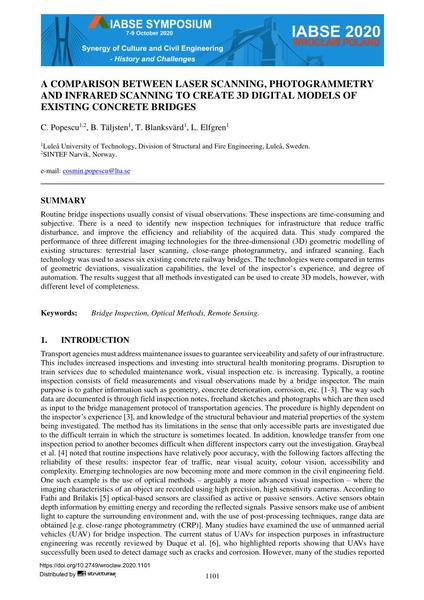A Comparison between Laser Scanning, Photogrammetry and Infrared Scanning to Create 3D Digital Models of Existing Concrete Bridges

|
|
|||||||||||
Bibliographic Details
| Author(s): |
C. Popescu
B. Täljsten T. Blanksvärd L. Elfgren |
||||
|---|---|---|---|---|---|
| Medium: | conference paper | ||||
| Language(s): | English | ||||
| Conference: | IABSE Symposium: Synergy of Culture and Civil Engineering – History and Challenges, Wrocław, Poland, 7-9 October 2020 | ||||
| Published in: | IABSE Symposium Wroclaw 2020 | ||||
|
|||||
| Page(s): | 1101-1108 | ||||
| Total no. of pages: | 8 | ||||
| Year: | 2020 | ||||
| DOI: | 10.2749/wroclaw.2020.1101 | ||||
| Abstract: |
Routine bridge inspections usually consist of visual observations. These inspections are time-consuming and subjective. There is a need to identify new inspection techniques for infrastructure that reduce traffic disturbance, and improve the efficiency and reliability of the acquired data. This study compared the performance of three different imaging technologies for the three-dimensional (3D) geometric modelling of existing structures: terrestrial laser scanning, close-range photogrammetry, and infrared scanning. Each technology was used to assess six existing concrete railway bridges. The technologies were compared in terms of geometric deviations, visualization capabilities, the level of the inspector’s experience, and degree of automation. The results suggest that all methods investigated can be used to create 3D models, however, with different level of completeness. |
||||
| Keywords: |
bridge Inspection remote sensing Optical Methods
|
||||
